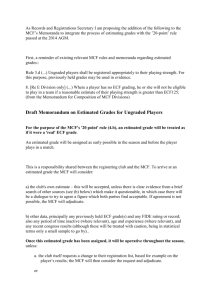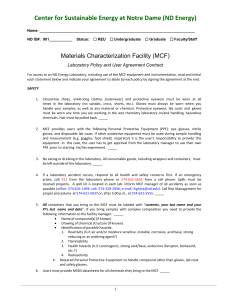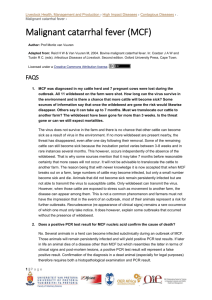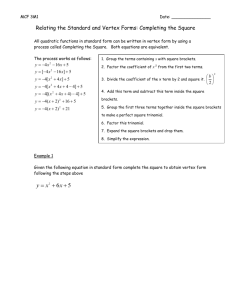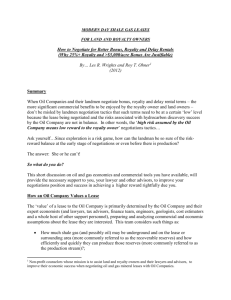Sustainable Energy at Notre Dame (cSEND)
advertisement
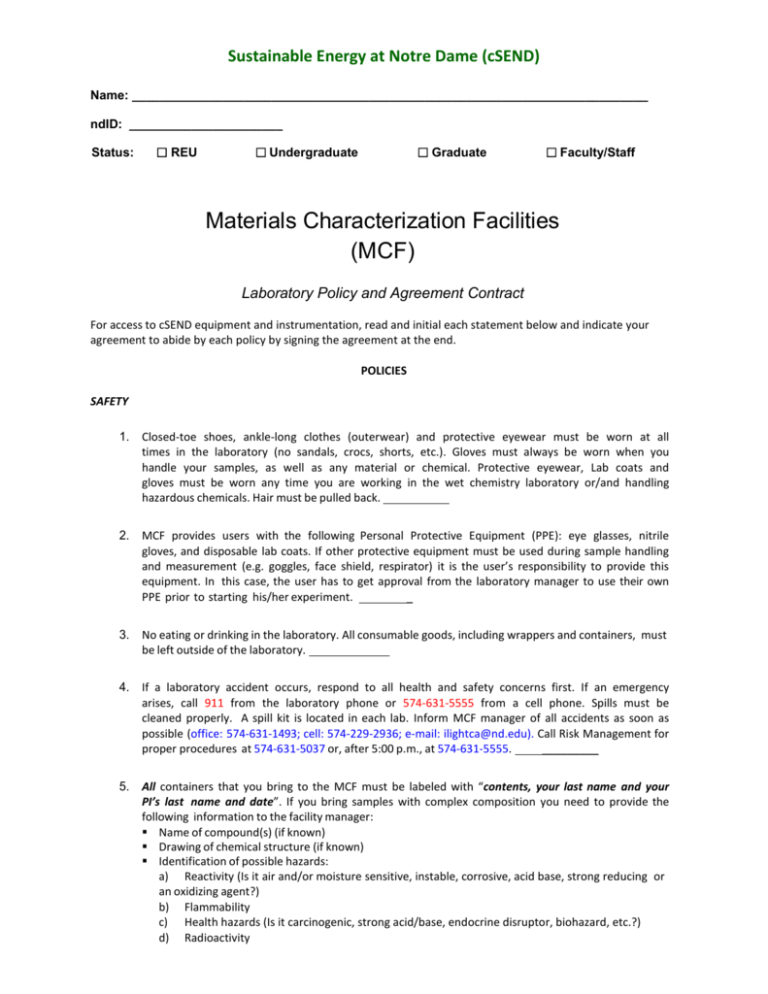
Sustainable Energy at Notre Dame (cSEND) Name: __________________________________________________________________________ ndID: ______________________ Status: REU Undergraduate Graduate Faculty/Staff Materials Characterization Facilities (MCF) Laboratory Policy and Agreement Contract For access to cSEND equipment and instrumentation, read and initial each statement below and indicate your agreement to abide by each policy by signing the agreement at the end. POLICIES SAFETY 1. Closed-toe shoes, ankle-long clothes (outerwear) and protective eyewear must be worn at all times in the laboratory (no sandals, crocs, shorts, etc.). Gloves must always be worn when you handle your samples, as well as any material or chemical. Protective eyewear, Lab coats and gloves must be worn any time you are working in the wet chemistry laboratory or/and handling hazardous chemicals. Hair must be pulled back. 2. MCF provides users with the following Personal Protective Equipment (PPE): eye glasses, nitrile gloves, and disposable lab coats. If other protective equipment must be used during sample handling and measurement (e.g. goggles, face shield, respirator) it is the user’s responsibility to provide this equipment. In this case, the user has to get approval from the laboratory manager to use their own PPE prior to starting his/her experiment. _ 3. No eating or drinking in the laboratory. All consumable goods, including wrappers and containers, must be left outside of the laboratory. 4. If a laboratory accident occurs, respond to all health and safety concerns first. If an emergency arises, call 911 from the laboratory phone or 574-631-5555 from a cell phone. Spills must be cleaned properly. A spill kit is located in each lab. Inform MCF manager of all accidents as soon as possible (office: 574-631-1493; cell: 574-229-2936; e-mail: ilightca@nd.edu). Call Risk Management for proper procedures at 574-631-5037 or, after 5:00 p.m., at 574-631-5555. _________ 5. All containers that you bring to the MCF must be labeled with “contents, your last name and your PI’s last name and date”. If you bring samples with complex composition you need to provide the following information to the facility manager: Name of compound(s) (if known) Drawing of chemical structure (if known) Identification of possible hazards: a) Reactivity (Is it air and/or moisture sensitive, instable, corrosive, acid base, strong reducing or an oxidizing agent?) b) Flammability c) Health hazards (Is it carcinogenic, strong acid/base, endocrine disruptor, biohazard, etc.?) d) Radioactivity Required Personal Protective Equipment to handle compound other than gloves, lab coat and safety glasses. 6. Users must provide MSDS datasheets for all chemicals they bring to the MCF. 7. If you intend to store your chemicals at the MCF, you must get the laboratory manager’s permission. All chemicals must be signed (see paragraph 5) and stored properly, according to the safety regulations, depending on the hazard identification. ____ 8. It is the responsibility of the user to inform the laboratory manager of all safety concerns regarding their sample handling and testing at the MCF prior to the experiment. 9. Project leaders, professors, and researchers are responsible for the proper training of their students and staff in safe laboratory practices, including the handling, transporting, and disposal of (bio) hazardous materials. 10. Highly toxic substances (toxicity grade 4) and samples t h a t are explosive and/or flammable when in contact with air or moisture must be handled exclusively in the glove box. Only micro quantities (volumes below 0.2 ml or masses below 1 mg) are allowed to be taken out of the glove box in the securely sealed containers for measurements. __________ 11. Sharps containers are located in all labs. Glass sharps and disposable glassware must be disposed only into the container with indicator “Glass sharps”. Syringes with sharp needles, metal and other nonglass sharps should be disposed only into the container with indicator “Needles”. __________ 12. Solid waste contaminated with hazardous chemicals and materials must be disposed in the designated waste bags stored in the fume hood (wet chemistry lab). Liquid waste should be disposed in the designated containers in the fume hood. MCF provides containers for nonchlorinated organics, chlorinated organics, acidic waste and basic/alkaline waste. If waste does not fit into one of the MCF designated waste streams (e.g. Hg or Cd contaminated wastes, radioactive or biological waste), the user must provide information from Risk Management on the appropriate disposal, provide the appropriate container, and properly label the waste for disposal. ________________ 13. When transferring or filing liquid nitrogen, t h e u s e r must always wear eye glasses, a face shield, and cryogenic gloves (provided by the MCF). 14. No laboratory items are to be taken into or disposed of in the MCF office area. 15. The user is not allowed to move or disconnect any equipment in the MCF including pressurized gas cylinders. If the user suspects a gas leak, he/she should immediately notify the laboratory manager. __________________ 16. The user must have a current record of a laboratory safety class or a laboratory safety refresher prior to being allowed to use MCF equipment or wet chemistry lab. Training opportunities and refresher courses can be found at http://riskmanagement.nd.edu/training/. _____________ 2 17. The user transporting, handling and testing radioactive samples must have a current record of a radiation safety class or refresher. Samples of radioactive materials may only be transported on campus by a means that is in compliance with University policy. Radioactive or potentially radioactive samples should be brought to the MCF in proper containers and handled in the designated area only (marked with a floor tape). Samples may not be placed outside the designated area. When working with potentially radioactive materials, the designated area must be chain restrained from the rest of the laboratory. Following the testing and removal of radioactive substances, the user must conduct a swipe test of exposed areas of the lab and/or instrument.___________ 18. Failure to follow all required safety policies may result in restricting or banning the user access to the MCF. _ ____ INSTRUMENT USE 1. Training and authorization by the laboratory manager is required before use of any MCF instrument. The user should not train other people. Undergraduate students are not allowed to work alone without supervision or prior approval from the MCF manager. ___________ 2. To use an instrument, the user must reserve a time through cores.nd.edu. If the user cannot make the appointment, they must cancel their entry as soon as possible. If the user scheduled more than a 4-hour measurement, he/she must notify the laboratory manager about cancellation. Failure to do so may result in extra charges. The instrument logbook must be filled out every time the instrument is used. ___________ 3. No repairs or modifications of instruments or computers will be performed by anyone but th e l a b o ra t or y manager. This includes the installation of any personal software or games on t h e MCF computers. The u ser must communicate to laboratory manager any errors or problems with instrumentation as soon as possible after the problems occur. _____________ 4. The user is responsible for backing up data. The laboratory manager will perform regular data removal from all instruments and is not required to contact the user prior to data removal. _________ 5. If a user’s negligence or impropriety causes any damage, the user may be held monetarily responsible and/or may be banned from the MCF. ___________ USER RESPONSIBILITIES 1. The user must leave all instrumentation, bench top areas, and other equipment clean and orderly. It is mandatory to remove all personal items and to clean up when finished each day. Storage of any items in the MCF is not allowed without permission from the laboratory manager. ____ 2. The user must not remove any MCF property from the laboratories without permission from the laboratory manager. Anything signed out must be returned in a timely fashion in the same condition in which it was loaned, or the user will be responsible for replacement. _______ 3. The MCF instruments are not to be used for personal consultation work or research that is not authorized by the University of Notre Dame. 4. Laboratory doors must be securely closed when the user departs (even if temporarily). 3 __ 5. The user is responsible for disposing of hazardous waste (including bio-hazardous waste) and for cleaning of the MCF equipment and lab space. 6. Use of MCF instruments should be explicitly acknowledged in any publication that results from the user’s research. __ POLICY AGREEMENT I have read and agree to uphold all cSEND laboratory policies as outlined above and initialed by me. Disregard of these policies could result in the loss of MCF privileges. _________________________________________ User Signature ______________________________________ Date __________________________________________ ______________________________________ Printed Name Email Address __________________________________________ ______________________________________ Department Campus Phone __________________________________________ ______________________________________ Advisor (Please Print) Grant Name and Number (for office use only) INSTRUMENTATION TRAINING User to initial and date after training is complete: TGA/DSC (132 NSH) BET (132 NSH) TGA/DSC/MassSpec (132 NSH) Microwave reactor (132 NSH) FTIR (132 NSH) Profilometer (132 NSH) Raman (132 NSH) DSC (132 NSH) UV-Vis (132 NSH) XPS (132 NSH) Zeta-Sizer (370 SCH) SEC-MALS (370 SCH) Thermal Evaporator PEC Tube Furnace GC-MS _______________MCF users must attend the Risk Management and Safety Laboratory Training Program and provide the MCF manager a copy of their general lab safety training card or most recent Safety Refresher Course. Program dates and registration information can be found at: http://riskmanagement.nd.edu/training. 4
